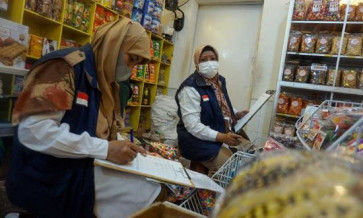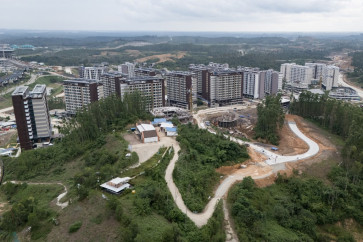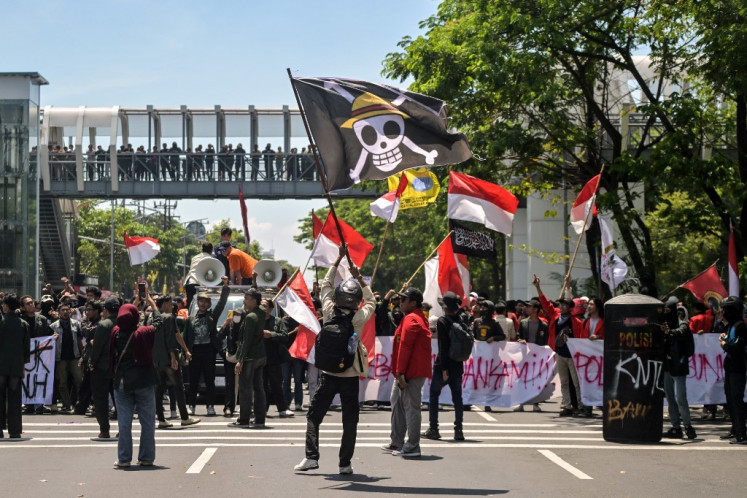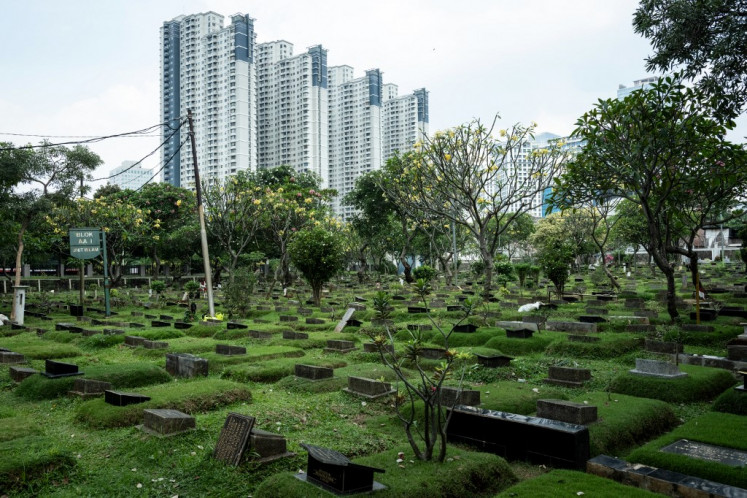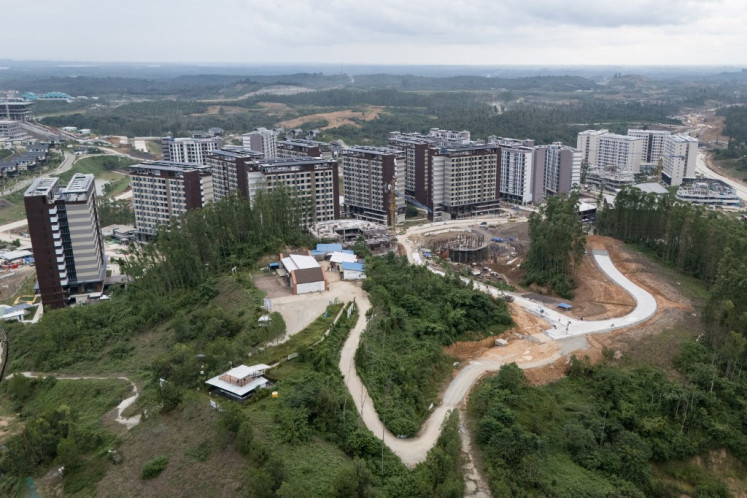Popular Reads
Top Results
Can't find what you're looking for?
View all search resultsPopular Reads
Top Results
Can't find what you're looking for?
View all search resultsTrash facility to employ pyrolysis machine
Grogol Selatan subdistrict head Agung Wibowo (right), joined by his subordinates, inspects a pyrolysis machine at the new Grogol Selatan subdistrict waste treatment facility in South Jakarta recently
Change text size
Gift Premium Articles
to Anyone
 Grogol Selatan subdistrict head Agung Wibowo (right), joined by his subordinates, inspects a pyrolysis machine at the new Grogol Selatan subdistrict waste treatment facility in South Jakarta recently. The facility, which cost Rp 600 million (US$44,430), has the capacity to treat up to a ton of waste per day.(JP/Sita Dewi) (right), joined by his subordinates, inspects a pyrolysis machine at the new Grogol Selatan subdistrict waste treatment facility in South Jakarta recently. The facility, which cost Rp 600 million (US$44,430), has the capacity to treat up to a ton of waste per day.(JP/Sita Dewi)
Grogol Selatan subdistrict head Agung Wibowo (right), joined by his subordinates, inspects a pyrolysis machine at the new Grogol Selatan subdistrict waste treatment facility in South Jakarta recently. The facility, which cost Rp 600 million (US$44,430), has the capacity to treat up to a ton of waste per day.(JP/Sita Dewi) (right), joined by his subordinates, inspects a pyrolysis machine at the new Grogol Selatan subdistrict waste treatment facility in South Jakarta recently. The facility, which cost Rp 600 million (US$44,430), has the capacity to treat up to a ton of waste per day.(JP/Sita Dewi)
G
span class="caption">Grogol Selatan subdistrict head Agung Wibowo (right), joined by his subordinates, inspects a pyrolysis machine at the new Grogol Selatan subdistrict waste treatment facility in South Jakarta recently. The facility, which cost Rp 600 million (US$44,430), has the capacity to treat up to a ton of waste per day.(JP/Sita Dewi)
In an effort to reduce waste in its area, a subdistrict in South Jakarta is set to launch a treatment facility with the capacity to process up to 1 metric ton of trash per day.
Grogol Selatan subdistrict head Agung Wibowo said that the new facility, which was funded by the Public Works and Public Housing Ministry and built on a 300-square-meter plot of land, was slated to start operating in August. The construction of the facility cost Rp 600 million (US$44,430).
'The pyrolysis machine, which was designed by a [Bandung Institute of Technology] ITB lecturer, has the capacity for up to a ton of waste ' including organic and non-organic ' a day,' Agung told The Jakarta Post while inspecting the facility recently.
Pyrolysis is a form of treatment that chemically decomposes organic materials using heat in the absence of or with a limited amount of oxygen. The method, also called gasification, has been touted by supporters as being cleaner than incineration, but debate is ongoing.
'The Grogol Selatan subdistrict produces up to 16 tons of waste a day. We still have to send the remaining waste to Bantar Gebang,' he said, referring to the Bantar Gebang landfill in Bekasi, West Java, where most of the capital's waste is sent.
Waste management remains one of the capital's ongoing problems. Jakarta produces up to 7,000 tons of waste daily, most of which goes unprocessed.
Agung said the facility might be able to expand in the future.
'The facility still separates waste manually due to limited space and technology. Once we can expand the facility, we may as well expand its capacity,' he said.
Agung acknowledged that reducing waste was among the biggest challenges in the area.
'There's a huge traditional market near my subdistrict and my area also serves as a transit area, where market vendors leave their garbage while passing through Grogol Selatan,' he said.
R. Agusman, the head of Pelita Grogol Selatan, a community group established to manage the treatment facility, said that the machine could help them to process plastic and organic waste.
'The organic waste will be processed into compost, while certain plastic waste will be recycled,' he said. The processed waste will be sold and the money generated will be used to cover operational costs.
The subdistrict head planned to hire and train five local trash collectors to operate the machine. 'They will also separate the waste,' Agung said.
Newly inaugurated Sanitation Agency head Isnawa Aji lauded the initiative, saying that local-level waste management was in line with efforts to resolve waste management issues in the capital.
'We can minimize waste volume by reducing waste at the lowest level, from household to subdistrict. It is far better than having to procure new waste trucks every year,' Isnawa said, adding that he had talked to relevant authorities to find solutions to the matter.
'I have talked with the education agency head to encourage the waste bank initiative at every school and with [city-owned market operator] PD Pasar Jaya's president director to manage waste at our traditional markets,' he said.
According to Isnawa, there were 133 traditional markets across the capital, which produce tons of waste every day, almost 90 percent of which is organic.
'Imagine if each market could manage its own organic waste; they could reduce waste production to almost none,' he said, adding that Pasar Jaya planned to build a waste treatment facility at Kramat Jati wholesale market, which produces 50 tons of waste daily.

